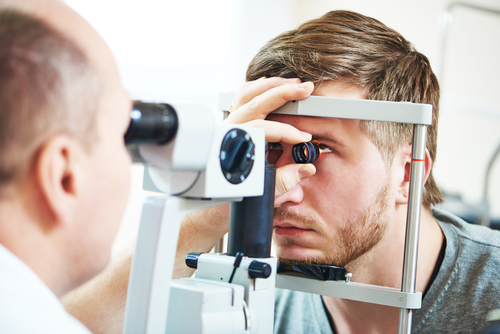Ask Ayurvedic doctor a question and get a consultation online on the problem of your concern in a free or paid mode. More than 2,000 experienced doctors work and wait for your questions on our site and help users to solve their health problems every day.
Ophthalmology

Ayurveda healing for Ophthalmology
The eye is the most important sense organ and it directly linked to the brain. It is a very sensitive organ that is extremely close to the working of the human brain. Eye diseases like myopia, cataract, glaucoma, and retinopathy are common.
Eyes are critical to the quality of life, these are the windows to the world and the soul. Vision is one of the five sensory organs that is used in Ayurvedic healing. Eye diseases today are very popular, which is partly caused by a number of fast life factors – long working hours at computers, poor eating habits, insufficient sleep hours, stress and so on. Also occur from long hours of watching TV, constantly reading small prints, inappropriate head position
How can an Ayurvedic doctor help in case of eye diseases?
Most eye diseases can be treated with Ayurvedic methods. Pitta dosha imbalance is definitely an important factor in starting Ayurvedic treatment for eye problems.
An important factor is the patient’s lifestyle, daily habits, exercises, genetic information, stress factor. Based on your personal information, the doctor will plan the course of treatment using the Ayurvedic methods and medicine. Shalakya Tantra is an Ayurvedic knowledge for the treatment of diseases of the neck and organs – special treatments used in Ayurveda.
Ayurvedic advice for eye health:
– Yoga eye exercises, if performed daily, are a gentle and effective way to prevent vision problems.
- Ayurveda recommends a range of dishes that strongly improve the quality of vision such as apples, sprouted chickpeas, carrots, almonds, green lettuce, vegetables and wheat bread.
- Too much sun exposure and steam bath is not good for eye problems,
- Excessive sexual intercourse.
- Avoid consuming greasy, spicy, and acidic foods
- Protect eyes from pollution and dust

Don't wait or self medicate. Start chat with Doctor NOW
What Causes Ophthalmology?
It seems there might be a misunderstanding in your question. Ophthalmology is a medical specialty focused on the study and treatment of eye disorders, and it is not typically considered a condition or something that “causes” issues. If you are referring to the causes of eye disorders or conditions related to ophthalmology, such as cataracts, glaucoma, or refractive errors, they can arise from various factors like age, genetics, environmental influences, and underlying health conditions. Clarifying your question might help provide a more accurate response.
Ways to Prevent Eye diseases According to Ayurveda
-
Eye Hygiene: Maintain cleanliness by washing eyes regularly.
-
Balanced Diet: Adopt an Ayurvedic diet with eye-friendly nutrients.
-
Herbal Eye Care: Use triphala for eye health, either in eye washes or supplements.
-
Avoid Eye Strain: Practice eye exercises and take breaks to prevent strain.
-
Ayurvedic Therapies: Consider Netra Tarpana for eye rejuvenation using medicated ghee.
What’s a List of Eye diseases?
Some Common Eye diseases Include:
Cataract Conjunctivitis Stye
Glaucoma Myopia

How Ayurveda Can Help Ophthalmology?
Ayurveda offers valuable support in the field of ophthalmology by focusing on holistic eye care. Through personalized dietary recommendations, incorporating eye-friendly herbs like triphala, and practicing eye exercises, Ayurveda aims to maintain and enhance visual health. Ayurvedic therapies, such as Netra Tarpana (eye rejuvenation), using medicated ghee, contribute to lubrication and nourishment of the eyes. By addressing underlying imbalances and promoting overall well-being, Ayurveda offers a complementary approach to conventional ophthalmic care. Consulting with an Ayurvedic practitioner allows for personalized strategies, aligning with individual constitution and specific eye health needs.
Which Parts of the Body Are Affected:
- eyes
- head
- brain
- coordination
- musculoskeletal disorders

Why Choose Ayurveda for Ophthalmology?
-
Holistic Eye Care: Ayurveda offers a holistic approach to ophthalmology, considering the interconnectedness of physical, mental, and lifestyle factors for comprehensive eye health.
-
Natural Remedies: Ayurvedic treatments involve natural remedies and herbal formulations, minimizing reliance on synthetic medications for eye conditions.
-
Individualized Care: Ayurveda tailors treatments based on individual constitutions, recognizing the uniqueness of each person’s eye health needs.
-
Preventive Measures: Ayurveda emphasizes preventive practices, guiding individuals to adopt dietary and lifestyle choices that maintain eye health and prevent issues from arising.
-
Therapeutic Modalities: Ayurveda incorporates various therapeutic modalities, such as eye exercises, herbal eye drops, and rejuvenating therapies like Netra Tarpana, offering a comprehensive and tailored approach to eye care.

Ayurvedic Wellness for Eye diseases at Alveda
At Alveda, our Ayurvedic Wellness program for eye diseases is rooted in a comprehensive approach to eye care. Tailored treatments integrate Ayurvedic principles, incorporating personalized dietary recommendations and herbal formulations known for their eye-rejuvenating properties. Alveda’s program emphasizes holistic well-being, including eye exercises and therapeutic interventions to promote optimal vision. With a focus on individualized care and preventive measures, our Ayurvedic Wellness program at Alveda provides a transformative journey toward maintaining and enhancing eye health. Consult with our experienced Ayurvedic practitioners for personalized guidance and holistic care specific to your eye health needs.

